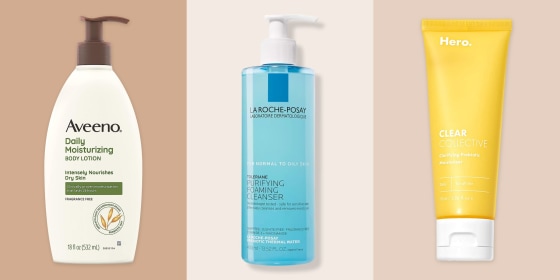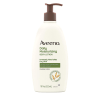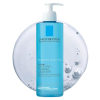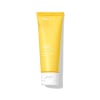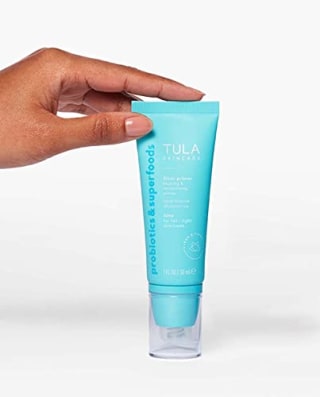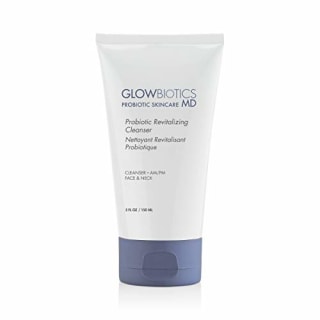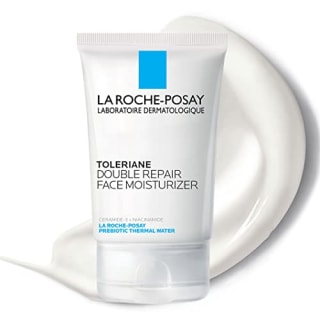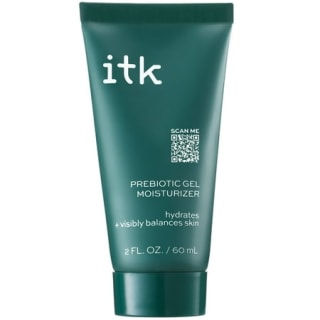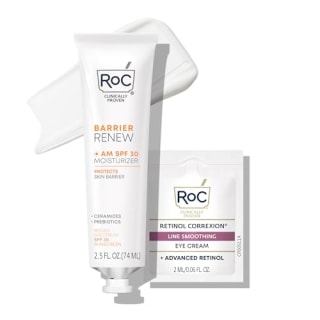Contrary to popular belief, bacteria is actually good for your skin. It helps make up the skin’s microbiome, which sits above your skin’s moisture barrier and plays a critical role in protecting skin from pathogens and keeping it hydrated and healthy. So it’s not shocking that prebiotic skin care products (aka formulas with key ingredients that serve as food for bacteria) are growing in popularity.
“Prebiotic ingredients are substances that support the growth and activity of beneficial microorganisms, like bacteria, on the skin,” says Dr. Navin Arora, a board-certified dermatologist in New York City. These ingredients help maintain a healthy skin microbiome by feeding and nourishing the “good bacteria” (aka probiotics) — which protect the moisture barrier — so they can flourish.
That’s important since certain habits, such as cleansing with harsh ingredients, can inadvertently remove this good bacteria, leading to an overgrowth of harmful bacteria; this can then trigger symptoms like redness, itchiness and dryness, according to New York-based board-certified dermatologist Dr. Rachel Nazarian. Thus, the benefits of prebiotics are far-reaching, she says.
To learn more about prebiotics in skin care and how you should incorporate them into your routine, I spoke with four board-certified dermatologists, who also shared their product recommendations along with some key guidance.
SKIP AHEAD What are prebiotics in skin care? | How I picked the best prebiotic skin care products | The best skin care products with prebiotics in 2024 | What are the best prebiotic ingredients for skin care? | How to shop for prebiotic skin care products | What is the difference between prebiotic and probiotic moisturizer? | Is prebiotic skin care good for acne?
What are prebiotics in skin care?
“Prebiotics are substances that support and foster the growth of healthy, beneficial bacteria in the overall context of our skin’s complex microbiome,” says Dr. Lauren Penzi, a board-certified dermatologist at MDCS in New York City. Basically, they’re food, which can fuel the good bacteria on skin so they don’t get crowded out by “bad” bacteria — which can cause redness, irritation and even breakouts.
“Prebiotics work on supporting the healthy bacteria by feeding them over potentially harmful bacteria,” Nazarian explains. Since “good” bacteria play a role in everything when it comes to the skin — like hydration, protection and even inflammation — supporting them can have a big payoff. “Using skin care with prebiotics can provide a number of benefits, including a strengthened skin barrier, improved hydration, protection against environmental stressors, a decrease in inflammation, reduction in acne and an overall better skin health,” says Penzi.
How I picked the best prebiotic skin care products
Prebiotic skin care products can differ in their overall formulation. Since their purpose is largely to support the microbiome (and therefore help your skin retain moisture and prevent allergens and viruses from getting in), it’s helpful to seek out formulas that have other skin barrier-friendly ingredients — like probiotics — and without ingredients that might counteract their benefits. When speaking with experts to create this list, they recommend I look for attributes like:
- Probiotics (in combination with prebiotics): Probiotics are the actual live bacteria that support your microbiome, while prebiotics serve as the food for that good bacteria in your microbiome (to help it maintain balance), says Dr. Geeta Yadav, a board-certified dermatologist in Toronto, Canada. (More on what specific terms to look for, below.) They help maintain your microbiome but because it’s unclear how much benefit you’re getting from them solo, pairing them with a prebiotic is ideal.
- Avoid skin-barrier disruptors: Because prebiotics cater to the skin barrier, which is what keeps moisture in and allergens and irritants out, dermatologists advise against formulas that might disrupt it, such as fragrance, alcohol and sulfates.
- Formula type: A leave-on product like a serum or cream can help you maximize the benefits of prebiotics in your skin-care formulas, since they’ll remain on your skin longer — although you’ll also find them in cleansers and face washes to prevent skin from feeling tight and dry.
The best skin care products with prebiotics in 2024
Tula Filter Blurring Moisturizing Primer
- Multiple shades
- Works as makeup
- Noncomedogenic
- May feel greasy
Both Arora and Nazarian recommend this brand for its probiotic and prebiotic formulas. This primer is designed to hydrate skin, blur pores and deliver a radiant finish; use it as the last step in your skin-care routine (so, after sunscreen). It has a proprietary complex of prebiotic and probiotic extracts, as well as licorice extract to even out skin tone over time. It also comes in four shades to suit every skin tone, plus an untinted option.
Glowbiotics Probiotic Revitalizing Cleanser
- Moisturizing
- Skin barrier-friendly
- Has fragrance
Nazarian likes this cleanser for its combination of Lactobacillus and Saccharomyces, which are prebiotic and (unliving) probiotic ingredients that serve as fuel for your microbiome. It also has beta-glucan, another oat-derived prebiotic that can help soothe skin, and vitamin E and aloe vera, which make it nourishing. It’s still powerful enough to remove makeup, too, according to the brand.
La Roche-Posay Toleriane Purifying Foaming Facial Cleanser
- Suits sensitive skin
- Doesn’t clog pores
- Fragrance-free
- Not ideal for dry skin
Intended for those with oily and sensitive skin, this foaming cleanser uses thermal spring water as its prebiotic source. Along with niacinamide and ceramides — lipids naturally found in the skin barrier, “this face wash gently cleanses skin of dirt, makeup and impurities while maintaining the skin’s natural moisture barrier and pH,” says Penzi.
Aveeno Daily Moisturizing Body Lotion
- Fragrance-free
- Generous size
- Accessible price
- Nothing to note at this time
The skin on my legs is very prone to dryness, so much so that they get itchy in the winter. That’s when I reach for this giant bottle. I like that the formula is fragrance-free and sinks into my skin quickly, and its moisturizing effect actually lasts until my next shower. It uses oat kernel flour as its prebiotic, and also has petrolatum (an occlusive) and dimethicone (an emollient) to seal moisture into skin, according to the brand.
La Roche-Posay Toleriane Double Repair Face Moisturizer
- Great price point
- Fragrance-free
- Absorbs quickly
- Small size
Included as our overall pick for the best moisturizers for mature skin precisely because of the prebiotics in its formula, this unscented cream also has expert-loved ingredients like ceramides and niacinamide to hydrate and moisturize skin, according to the brand. And, since it’s oil-free, it’s unlikely to clog pores and doesn’t leave a greasy feel — making it great if you’re acne-prone, too.
“This is one of my absolute favorite moisturizers and I recommend it to everyone,” says NBC Select associate reporter Bianca Alvarez. “I constantly gravitate toward using it in my morning routine because it gives my super dry skin enough moisture and hydration without it being too heavy and thick since it has a very lightweight, fast-absorbing quality. It’s a little pricier, but a little goes a long way, and it’s very easy to spread and creates a nice thin layer.”
Itk Prebiotic Gel Moisturizer
- Oil-free
- Suits sensitive skin
- Lightweight texture
- Has a scent
This gel moisturizer has multiple prebiotics, including inulin — which our experts consider one of the best prebiotic ingredients — as well as niacinamide and squalane to nourish skin, according to the brand. “It hydrated my skin and didn’t irritate it at all,” says NBC Select associate updates editor Zoe Malin; she also likes the mild scent (although it’s free of synthetic fragrances) and says that a little goes a long way — which is why it ranked so well in our list of the 100 best moisturizers.
Mighty Patch Clear Collective Clarifying Prebiotic Moisturizer
- Absorbs quickly
- Won’t clog pores
- Gentle formula
- Tube doesn’t last long
This fragrance-free moisturizer uses a prebiotic sugar complex to support the microbiome. It also has ceramides to replenish moisture and sage extract to clarify pores, according to the brand, making it a good option for those with oily or acne-prone skin. “I like that it has a super lightweight, lotion-like texture that my skin quickly absorbs, making it easy to apply under my makeup,” says NBC Select updates editor Mili Godio.
Roc Barrier Renew AM SPF 30 Moisturizer
- Fragrance-free
- Has SPF 30
- Suits sensitive skin
- Small tube
One of the best creams to help repair your skin barrier, this multitasker is ideal for daytime wear. It’s formulated with a blend of ceramides to support the skin barrier, squalane to hydrate and prebiotics to balance skin, according to the brand. The built-in broad-spectrum SPF 30 gives you some necessary UV protection and doesn’t leave a white cast on darker skin tones.
“It has that slight sunscreen smell, but I’m happy to report that it doesn’t leave behind a white cast and blends in really nicely, leaving a beautiful sheen on my skin,” says SEO editor Nikki Brown. “It also layers well with other products, I like using it alongside a hyaluronic acid serum.”
What are the best prebiotic ingredients for skin care?
Prebiotics are ingredients that bacteria like to eat. “While you might find skin care products that are formulated with extracts derived from those foods — such as oat, burdock, or chicory root — to get their prebiotic benefits, you’ll typically see the prebiotic compounds themselves on an ingredient list,” says Yadav. If you scope out an ingredient list, you might find ingredients such as:
- Glycerol: This is both a plant-based sugar and common skin-hydrating ingredient, according to Nazarian.
- Inulin: This is a type of fiber found in plants that’s known to promote bacteria growth.
- Chicory root extract: This is rich in inulin and thus helps support the skin’s microbiome, says Arora.
- Oligosaccharides: These are carbohydrates that act as a food source for beneficial bacteria, according to Arora.
- Lactic acid: A naturally occurring acid, this “can have prebiotic effects by supporting beneficial skin flora,” says Arora.
How to shop for prebiotic skin care products
Prebiotic skin care products can vary in terms of the exact prebiotic ingredients (mentioned above) they use as well as what else is in their formula. One popular ingredient is probiotics. Probiotics are the actual bacteria, while prebiotics feed the existing bacteria. Looking for formulas that combine the two gives you comprehensive skin microbiome support, says Penzi.
Keep in mind that products won’t always tell you what kind of bacteria are in your products — nor how much, says Nazarian. (That’s because it’s hard to quantify how much bacteria is in a given product when it’s first created, and how many remain by time you apply it to your skin.) So, if you don’t see it on the label when you shop, she recommends checking the ingredient list for probiotic strains such as:
- Lactobacillus
- Lactococcus
- Saccharomyces
- Streptococcus thermophilus
The goal of including prebiotics in your skin care routine is to support your skin barrier, which is in charge of keeping moisture in and preventing harmful, external aggressors, like allergens and viruses, from getting into your skin. So to that end, avoid ingredients that can strip the skin or disrupt the natural microbiome, says Nazarian. She recommends steering clear of:
- Triclosan, a common ingredient in soaps
- Sulfates, a group of cleansing agents
- Fragrance or perfume, which can be irritating to some
- Alcohols, which can be drying
These ingredients “have some potential to disrupt the pH of skin and the natural bacteria,” she says.
And finally, it will be especially beneficial to look for leave-on formulas, since they’ll spend more time on your skin and, as a result, offer more long-lasting benefits. However, you can still benefit from using prebiotics in a face wash — since the sheer act of cleansing, can leave skin feeling dry and stripped, says Nazarian. The inclusion of a prebiotic may “make it less harmful for sensitive skin, even if it’s a cleanser,” she says.
What is the difference between prebiotic and probiotic moisturizers?
Generally speaking, probiotics are live microorganisms that help enhance the health of the host. Your skin is brimming with them. As it pertains to your skin care routine, probiotics refer to the good bacteria itself that you can directly introduce to the skin, says Penzi. Prebiotics naturally exist on your skin, too; they’re necessary to sustain those probiotics.
However, “probiotics are notoriously finicky with their stability,” says Nazarian. That’s because they’re most helpful when they’re alive, which can be pretty tricky when you factor in that formulas need to have preservatives that actually stymie bacteria growth so your moisturizers and serums don’t grow mold. And, “if the product is not created properly, stored properly or shipped properly, there’s a risk that the probiotics don’t survive — and your product has nothing to offer in terms of viable probiotic material,” she says.
That’s why this particular corner of the skin care space requires more investigation, oversight and evaluation, says Nazarian. Plus, “it’s important to note that many of the studies on probiotics are done on oral supplementation, and information about topical use is only more recently emerging,” she says.
That said, this isn’t an issue with prebiotics, which “don’t need to be ‘alive’ to be effective,” says Yadav. So they don’t have this baggage, you can rest easy knowing that you’re getting the prebiotic ingredients — and their benefits — from a given moisturizer or cleanser.
Is prebiotic skin care good for acne?
In short, yes. Anyone can benefit from using them in their skin care regimen, since they help support the skin barrier and improve hydration. But those with barrier-repair concerns or inflammatory skin conditions, such as eczema and acne, may see even more of a benefit, according to Nazarian. Plus, “an altered microbiome has been shown to be part of the pathogenesis of eczema and other similar inflammatory skin conditions,” says Penzi.
They can also be helpful if you’ve taken antibiotics for acne, which research has found to be very effective for moderate to severe acne. “For patients coming off a course of antibiotics, the skin microbiome may experience disruptions,” says Penzi. Introducing a prebiotic skin care product can help rebalance it.
Meet our experts
At NBC Select, we work with experts who have specialized knowledge and authority based on relevant training and/or experience. We also take steps to ensure all expert advice and recommendations are made independently and without undisclosed financial conflicts of interest.
- Dr. Rachel Nazarian, FAAD is a board-certified dermatologist at Schweiger Dermatology Group in New York City who specializes in cosmetic treatments, laser, injectables and skin cancer screenings.
- Dr. Navin Arora, FAAD is a board-certified dermatologist at Borealis Dermatology in New York, New York who focuses on a broad spectrum of skin, hair and nail diseases.
- Dr. Geeta Yadav is a board-certified dermatologist based in Toronto, Canada with an interest in atopic dermatitis, psoriasis and skin cancer.
- Dr. Lauren Penzi, FAAD is a board-certified dermatologist at MDCS in Long Island, New York, who specializes in both cosmetic and medical dermatology.
Why trust NBC Select?
Deanna Pai is a freelance beauty writer and editor who has been covering beauty and health for more than a decade, including topics like pregnancy-safe sunscreen, skin care products with peptides and at-home microcurrent devices. For this article, Pai spoke to four dermatologists to narrow down the best prebiotic skin care products, and highlighted their recommendations along with some NBC Select-staff favorites, about what to consider when shopping.
Catch up on Select’s in-depth coverage of personal finance, tech and tools, wellness and more, and follow us on Facebook, Instagram, Twitter and TikTok to stay up to date.
